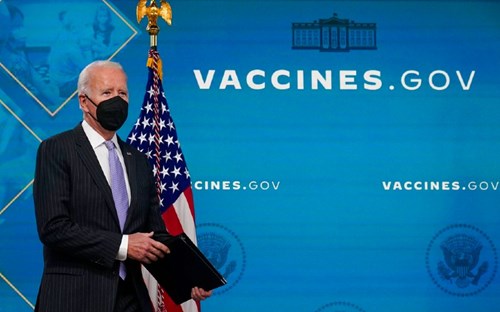The 77th World Health Assembly runs Monday through Friday of next week.
The agreement, if approved, would threaten the sovereignty of the United States and other nations who sign on by granting the WHO, the much-criticized health arm of the United Nations, the sole authority to determine health emergencies such as the COVID-19 pandemic.
UPDATE:
Controversial proposal to give
WHO more power put on hold
With such power, the WHO could assign vaccines and mask mandates, lockdowns, travel restrictions and much, much more.
Travis Weber, the Family Research Council’s vice president for Policy and Government Affairs, said on Washington Watch Thursday there are finally some "logjams" over the agreement.
One big logjam came this week when two dozen Republican governors wrote to President Joe Biden to express their opposition.
"It’s understandable," he observed, "that sovereign nations do not want to give up their right to control their own intellectual property, their own productivity, economic output and sovereignty, the ability to determine the course of actions for their nations."
 The Biden administration has not only supported the WHO in this endeavor, it has been one of the chief architects of the plan, Dr. Robert Malone, chief medical and regulatory officer for The Unity Project, said on Washington Watch last week.
The Biden administration has not only supported the WHO in this endeavor, it has been one of the chief architects of the plan, Dr. Robert Malone, chief medical and regulatory officer for The Unity Project, said on Washington Watch last week.
While the administration embraces the WHO plan, many on Capitol Hill do not. Forty-nine U.S. senators recently wrote to Biden telling him they find it “unacceptable” to give away U.S. decision-making power to the WHO for future health emergencies.
"The WHO's failure during the COVID-19 pandemic was as total as it was predictable and did lasting harm to our country," says the letter.
Rep. Tom Tiffany (R-Wisconsin) introduced legislation in the House that would treat the agreement like a treaty and require a two-thirds super majority vote in the Senate for ratification.
Governors see states’ rights trampled
Some U.S. governors have expressed concernsthe agreement would erode state sovereignty by allowing the WHO to dictate responses to public health emergencies, stripping elected representatives of their role in setting public health policies, and compelling citizens to comply with WHO directives, including mandates regarding medical treatments.
The signatories to the letter include governors from 24 states: Alabama, Alaska, Arkansas, Florida, Georgia, Idaho, Indiana, Iowa, Louisiana, Mississippi, Montana, Nebraska, Nevada, New Hampshire, North Dakota, Oklahoma, South Carolina, South Dakota, Tennessee, Texas, Utah, Virginia, West Virginia, and Wyoming.
 “The governors have a very important claim that they make in that letter," Weber told show host Tony Perkins. "As a constitutional matter, we hear a lot in the press right now about protecting democracy. Well, if we’re going to look at that, the Constitution does not put healthcare the hands of the federal government to be automatically put in the hands of an international body like the WHO."
“The governors have a very important claim that they make in that letter," Weber told show host Tony Perkins. "As a constitutional matter, we hear a lot in the press right now about protecting democracy. Well, if we’re going to look at that, the Constitution does not put healthcare the hands of the federal government to be automatically put in the hands of an international body like the WHO."
There has been more vocal opposition beyond Capitol Hill.
Brigitte Gabriel, founder and president of ACT for America, warns backing the WHO would deal a death blow to freedom around the world, robbing individuals of their human rights over medical choices, doctors, medicines, public forums, freedom of movement, freedom of speech, and the right to oppose lockdowns and refuse forced vaccines.
The national defense expert and conservative activist is adamant Biden must be stopped from signing the document.

"This effort is a part of a larger World Economic Forum and 'Great Reset' agenda using the Trojan horse of the pandemic emergency to suspend the U.S. Constitution, U.S. laws and freedom in America and [that of] 193 other nations. We cannot let them do that," she tells AFN.
H.R. 79 in the U.S. House requires the president to immediately withdraw the U.S. from the WHO and prohibits using any federal funds to provide for U.S. participation in the WHO. H.R. 1425 requires any agreement on pandemic prevention, preparedness, and response by the WHO to be subject to ratification by the U.S. Senate.
Gabriel urges WHO exit, defunding
Gabriel urges Americans to call on Congress to exit and defund the WHO and to pass an emergency joint resolution to stop Biden from entering into this agreement.
"It's not just whether you get vaccinated – it's lockdowns, it's whether you can travel, it's whether you can speak, it's about your relationship with your doctors," she exclaims. "We need to make sure we call Congress immediately and put pressure on members of Congress to stop this insanity."
Weber said the U.S. and the world are not ready for this agreement now...if ever.
“There are things that have to be considered,” he said. “No way is there agreement right now. Nations should not be rushing into this. This needs to be delayed and considered before there’s an agreement to it.”







